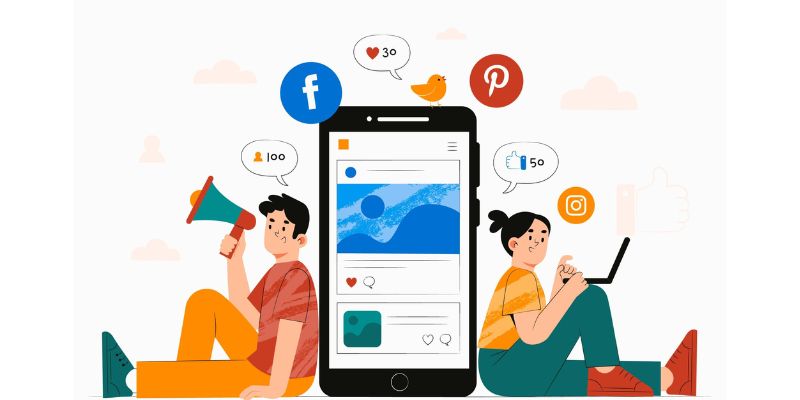The Five Key Social Media Trends for Mobile App Development

Link Building 101: How to Increase Your Website Authority in 7 Steps
November 20, 2023
Boost your Restaurants Online Presence and Become an Instagram-Sensation!
November 26, 2023In today’s digital age, social media plays a pivotal role in our daily existence. From connecting with friends and family to serving as a platform for discovering new products and services, social media platforms have revolutionized our interactions with the world For mobile app developers, staying at the forefront of the industry involves a keen understanding and utilization of these dynamic social media trends.
1. The Social Commerce Revolution
The one trend that demands attention is the rise of social commerce. Mobile app developers are actively embracing this trend by creating applications that not only foster social connections but also offer a seamless shopping experience. The integration of commerce elements within social media apps allows users to browse, select, and purchase products without the need to switch between different platforms.
Key aspects of the Social Commerce Revolution in mobile app development include:
In-App Shopping Features: Instagram, Facebook, and Pinterest have smoothly incorporated shopping functionalities, enabling users to explore, choose, and buy products without leaving the app. This streamlines the user journey and encourages impulsive buying.
Social Recommendations and Reviews: Mobile apps are leveraging social interactions to provide product recommendations, reviews, and ratings from peers, fostering a sense of trust and community.
Live Shopping Experiences: The integration of live video streams for product demonstrations and interactive sessions allows users to ask questions, get instant feedback, and make informed purchase decisions.
Personalized Shopping Experiences: Social commerce platforms are leveraging data analytics and artificial intelligence to understand user preferences and provide personalized product recommendations. This tailored approach enhances user satisfaction and repeat purchases.
2. Augmented Reality (AR) and Social Filters
These technologies have redefined user experiences, particularly in the realm of social media apps.These filters not just improve user engagement but also encourage social sharing, ultimately increasing app visibility and attracting more users.
Here’s an exploration of how AR and Social Filters are shaping the mobile app landscape:
Augmented Reality (AR) Integration: A significant advantage of using augmented reality in mobile app development is its ability to enhance user experience, increase customer engagement by providing an interactive experience, and increase brand awareness and sales by providing a unique and innovative marketing experience for customers.
Social Filters and Lenses: Social Filters, often synonymous with AR lenses, are a popular trend in mobile app development, especially within social media platforms, allowing users to express themselves creatively and share engaging content with their social circles. Users can apply various filters that alter facial features, add animations, or change the background in real time. Snapchat, Instagram, and Facebook are notable examples of platforms that have successfully integrated these Social Filters.
3. Video-First Content
The dominance of video content is undeniable. Mobile apps should adopt this trend by integrating features for creating and sharing videos. This strategy involves placing video elements at the forefront of the user experience, leveraging the power of visual and audio communication to engage users effectively. Distinguishing your app in the competitive market is achievable by incorporating live streaming, user-generated content, and interactive video features. `
Here are some video-first content trends in the context of social media and mobile app development:
- Short-Form Video Dominance
- Live Video Streaming allows users and brands to connect with their audiences in real-time
- Stories and Fleets enable users to share temporary content, including videos.
- AR Filters and Effects became a popular way to enhance user engagement.
- Vertical Video Format to provide a seamless and immersive user experience
- Interactive Video Features to increase user engagement and time spent on the platform
- Ephemeral Content and Disappearing Videos encourage users to share in-the-moment videos that disappear after a short period.
- Video Shopping and Product Discovery through videos gained traction for e-commerce purposes.
- User-generated content (UGC) encourages users to create and share their videos.
- Algorithmic Feeds Emphasizing Video encouraged content creators and brands to incorporate video into their social media strategies.
4. Personalization and AI
Social media giants are using AI to deliver personalized content to users. Mobile app developers can leverage AI to offer personalized recommendations and content feeds, enhancing user retention. By analysing user behaviour, app developers can create a tailored social experience that keeps users engaged.
Personalization Trends
- Tailored content delivery.
- Personalized push notifications based on user behaviour, location, and preferences to enhance user engagement.
- Customizable User Interfaces, including themes, layouts, and content preferences, provide a more personalized experience.
- Contextual recommendations for friends to connect with, content to follow, or products to purchase based on user behaviour and preferences.
AI Trends
- Chatbots and Virtual Assistants to enhance user interactions, provide customer support, and streamline communication.
- Content Moderation, identifying and filtering out inappropriate content, hate speech, and spam.
- Automated Content Generation, including captions, hashtags, and even basic articles, reduces the burden on content creators.
- Facial Recognition and AR technology are integrated into social media apps for features like tagging friends in photos.
- Predictive Analytics analyses user behaviour to predict preferences, helping social media platforms suggest relevant content, friends to connect with, or products to purchase.
- Emotion Recognition analyzes user reactions, comments, and interactions to understand emotional responses, providing insights for content creators and advertisers.
5. Social Audio and Podcasts
The current rise in social audio platforms such as Clubhouse and Twitter Spaces offers exciting opportunities for mobile app developers. By incorporating social audio and podcasting functionalities into your app, you can cultivate community interaction and facilitate the exchange of knowledge. This emerging trend creates fresh opportunities for both user engagement and monetization. Some platforms allow users to create and share their podcasts directly within the app, giving individuals and creators a voice. Users can join live audio events, such as panel discussions, interviews, and virtual shows, enhancing the sense of participation and connection. Social audio experiences are often designed to be accessible across different devices, ensuring that users can seamlessly transition between mobile phones, tablets, and other platforms. Users can interact with hosts and other participants through features like reactions, emojis, and live polls, creating a dynamic and engaging environment.
CONCLUSION
Remaining competitive in mobile app development requires a keen awareness of social media trends. Elevate your app’s user experience by integrating features such as social commerce, augmented reality (AR), video, AI-driven personalization, and social audio. Stay proficient in development skills, embrace the latest APIs and libraries, and ride the wave of social media innovation to craft technically advanced and user-centric mobile applications.




